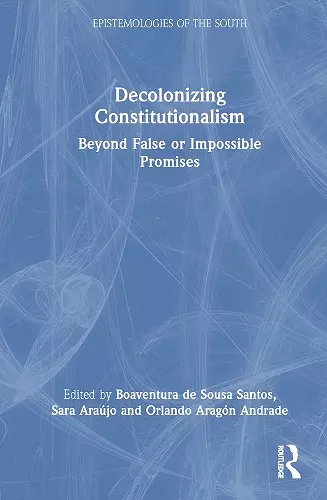Decolonizing Constitutionalism
Beyond False or Impossible Promises
Boaventura de Sousa Santos editor Sara Araújo editor Orlando Aragón Andrade editor
Format:Hardback
Publisher:Taylor & Francis Ltd
Published:31st Jul '23
Currently unavailable, and unfortunately no date known when it will be back
This hardback is available in another edition too:
- Paperback£39.99(9781032490274)

The modern state, law, and constitution result from a legal canon that (re)produces the abyssal lines dividing the world that is validated from the world whose humanity and epistemological validity are denied. This book aims to contribute to a post-abyssal reflection on law and constitutionalism by considering the structural axes of power that are constitutive of modern law “capitalism, colonialism, and heteropatriarchy” alongside the legal plurality of the world. Is it possible to decolonize, decommodify, and depatriarchalize the constitution? The authors speak from multiple geographies, raise different questions, resort to differentiated theoretical approaches, and reveal varying levels of optimism about the possibilities of transforming constitutions. The readers are confronted with critical perspectives on the Eurocentric legal canon, as well as with the recognition of anti-capitalist, anti-colonial, and anti-patriarchal legal experiences. The horizon of this publication is the expansion of the possibilities of legal and political imagination.
This is an important edited volume framed by the groundbreaking theoretical work of Professor Boaventura de Sousa Santos. This scholarship has set aside a singular focus on the Eurocentric view of the law and developed in its place an 'epistemology of the South,' based upon the knowledges of those excluded, appropriated, and subject to the violence of the state. The goal of this project is to expand our political imagination to allow for the emergence of alternative forms of politics in oppressed communities. The book makes available the important findings of a collaborative research project on struggles for social justice in the global South. It is based upon a cutting-edge theoretical framework which explores the potential for constitutional change outside of a state-centric approach. The volume provides essential reading for those working in the area of comparative constitutionalism and will stimulate new research and thinking for the next generation of scholars in the field.
– Kristin Bumiller, Amherst College
This is an important and very useful contribution to the connected subjects of democracies, social justice and political activism, human rights, law and legal orders, and power and economies across societies. It moves beyond the surface of introduction and explanation of abyssal thinking to a range of post-abyssal possibilities and applications across multiple geographies and peoples with different questions. All the authors take up the challenges of decolonization, decommodification, and ‘depatriarchalization’, and all of the authors ground their writing in the experiences and realities of peoples around the globe. Abyssal thinking proves to be a critical lens in the subject instances of each chapter, and the reader will be able to see how abyssal thinking may be extrapolated to other issues and circumstances. I think this is an outstanding book and I am excited by its publication and availability.
– Val Napoleon, University of British Columbia
Studying constitutions (and other topics) from the perspective of the global South is important and the Epistemologies of the South have been ignored for too long. Its discussion of indigenous voices, especially indigenous women, and indigenous justice is one of the most important contributions of the book. This book adds a vitally important, yet often ignored, dimension to scholarship. It is not only timely but long overdue.
– Sumudu Atapattu, University of Wisconsin
ISBN: 9781032490311
Dimensions: unknown
Weight: 453g
338 pages